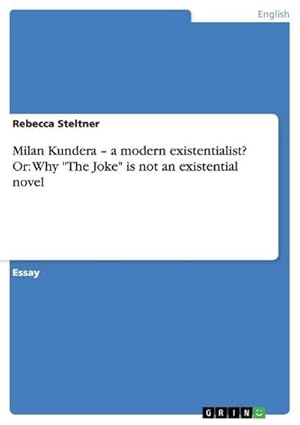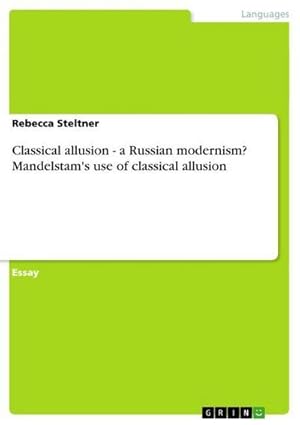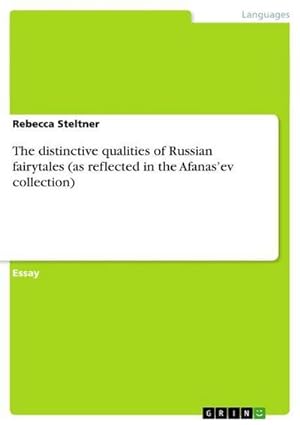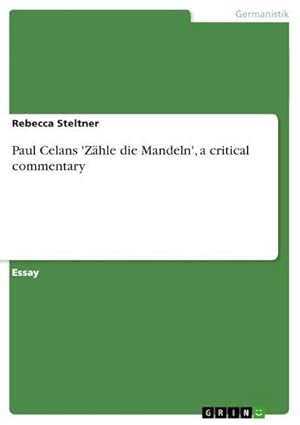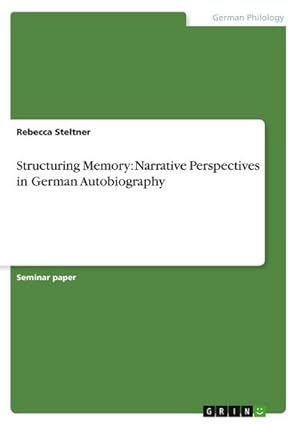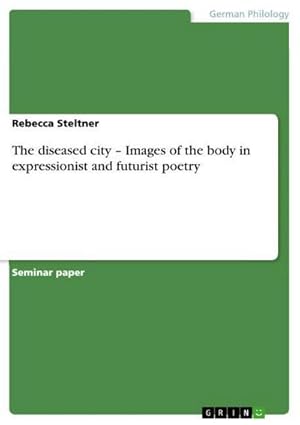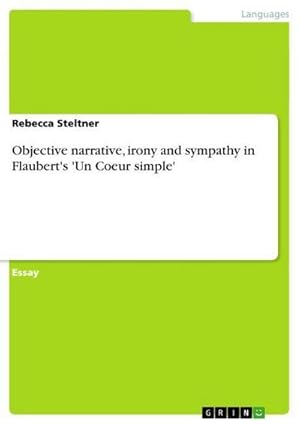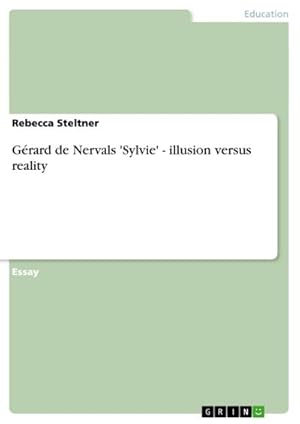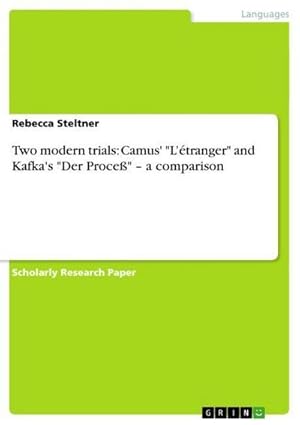STELTNER, REBECCA (9 Ergebnisse)
Produktart
- Alle Produktarten
- Bücher (9)
- Magazine & Zeitschriften
- Comics
- Noten
- Kunst, Grafik & Poster
- Fotografien
- Karten
-
Manuskripte &
Papierantiquitäten
Zustand
- Alle
- Neu
- Antiquarisch/Gebraucht
Einband
- alle Einbände
- Hardcover
- Softcover
Weitere Eigenschaften
- Erstausgabe
- Signiert
- Schutzumschlag
- Angebotsfoto
Land des Verkäufers
Verkäuferbewertung
-
Milan Kundera ¿ a modern existentialist? Or: Why "The Joke" is not an existential novel
Verlag: GRIN Verlag, 2015
ISBN 10: 3668105502ISBN 13: 9783668105508
Anbieter: Smartbuy, Einbeck, Deutschland
Buch
Taschenbuch. Zustand: Neu. Druck auf Anfrage Neuware - Printed after ordering - Essay from the year 2002 in the subject English Language and Literature Studies - Comparative Literature, grade: A, University of Kent, course: Philosophy in Literature, 7 entries in the bibliography, language: English, abstract: Milan Kundera's novel 'The Joke' abounds in existentialist vocabulary and themes. His main character's narrative is loaded with such expressions as choiceandexistence, self-deceptionorfreedom,which are sometimes even set in Italics. These are not just words, that Ludvik uses in his narrative, they are also made themes in themselves as well as reoccurring motifs - for example that of the 'destruction of façades'. These themes are important, from the very beginning as we have the basic condition of someone 'crossing the border', which is not altogether dissimilar to Roquentin's predicament in Sartre'sLa Nausée.All situations, that Kundera's characters find themselves in are existential, too, in such a way, that they require choices and a wholly new perspective on the past after the destruction of old value systems.It is therefore obvious that existentialist ideas must have influenced and inspired Kundera, and as Existentialism is in itself a philosophy that focuses greatly on perception and the possibility of self-knowledge, one could even propose to say, that its ideas are always also central to modern novel writing especially when we look at psychological novels and first-person narratives.However, (I would argue that)The Joke is by no means an existentialist novel, as its approach to ideas is by no means direct, but playful as well as critical. This is why it is impossible, to say, that for example, the novel reflects on the nature of self-deception, and its main character is in 'bad faith'. Such an approach, does not do the novel justice, and at this point it may well be worth remembering, that its author, too, resists such an attempt:'My disgust for those who reduce a work to its ideas: my revulsion at being dragged into what they call 'discussions of ideas.' My despair at this era befogged with ideas and indifferent to works.' (Art of the Novel, p. 131).Now, let me first quickly define, what I understand by 'existentialist novel' before we can then look at a few actual passages and maybe reach the above verdict.Existentialists, like Sartre, have always used fiction to convey their ideas. According to Edith Kern, Simone de Beauvoir even thought of the novel as the most appropriate means of presenting existentialist thought: 'The novel seemed to her [Simone de Beauvoir] particularly suited to the expression of existential insights which would seem contradictory if they were to be presented categorically and systematically.' 16 pp. Englisch.
-
Classical allusion - a Russian modernism? Mandelstam's use of classical allusion
Verlag: GRIN Verlag, 2007
ISBN 10: 3638758273ISBN 13: 9783638758277
Anbieter: AHA-BUCH GmbH, Einbeck, Deutschland
Buch
Taschenbuch. Zustand: Neu. Druck auf Anfrage Neuware - Printed after ordering - Essay from the year 2002 in the subject Russian / Slavic Languages, grade: A, University of Canterbury (School of European Culture and Languages), course: Seminar, language: English, abstract: Before we look at individual poems and the many allusions to Greek Mythology, it is necessary - as always it seems - to make a few remarks on translation. Afterwards, it might be helpful to ask ourselves a few general questions as to why and to what effect authors have used or are still using myth in their writing; so that we can then try to establish which of these approaches is closest to Mandelstam's use of Greek Mythology.Fortunately, Mandelstam has commented widely on general questions of poetics, in his essays, which often take the form of reviews of other authors and their shortcomings. By then applying these criteria to Mandelstam's own work and thus knowing his poetic aspirations, his poetry should appear less enigmatic. Especially, as Greek Myth lies at the centre of Mandelstam's poetic thought, an analysis of these statements is a valid and useful approach in order to gain access to his demanding poetry.Using a variety of examples of Mandelstam's use of Greek Myth, I will quote from various poems from his two earlier collections Kamen (The Stone) and Tristia and then finally take a closer look at his poem Silentium. Unfortunately, I will not be able to individually interpret all the poems which I have searched for Greek allusions, nor can I print them here in full. Yet, I will attempt to give a full picture of the context that these quotes come from.
-
The distinctive qualities of Russian fairytales (as reflected in the Afanas¿ev collection)
Verlag: GRIN Verlag, 2007
ISBN 10: 3638758443ISBN 13: 9783638758444
Anbieter: AHA-BUCH GmbH, Einbeck, Deutschland
Buch
Taschenbuch. Zustand: Neu. Druck auf Anfrage Neuware - Printed after ordering - Essay from the year 2001 in the subject Russian / Slavic Languages, grade: 75 (A), University of Canterbury (School of European Culture and Languages), course: Seminar, language: English, abstract: Most of the fairy tales that we find in the Afanas'ev collection are both strange and familiar at the same time. They are familiar, because many of the Russian fairy tales are in fact renderings of stories we already know e.g. from the Brothers Grimm. Here too, the famous Cinderella theme and stories similar to The Magic Table, The Gold-Donkey, And Cudgel in the Sack1 or The Golden Bird are very popular. There are indeed, very few plots that are not reminiscent of Western fairy tales. Why exactly this is the case is unknown. It may be that the stories travelled or that they were taken up into the Russian folklore after the Grimms' had published their stories in Germany.Yet, the Russian fairy stories are by no means just copies. Russian folklore has a long history and through being narrated within a different culture every story is shaped differently and is adapted to its new surroundings.Therefore the best way to find out what the distinctive qualities of Russian fairytales are, is to read as many Russian tales as possible and to compare them to the versions we know in order to find out, what it is that is typical and unique to the Russian tales. When we have found this quintessential difference, we shall have found what makes them 'strange'.To find out, we need to look at what are perhaps the four most important aspects of any story: its 'Themes and Content', how these are illustrated with 'Motifs' and how 'Narrative Structure' and 'Language' are used.Themes and Afanasiev's recordings include a large variety of folk narrative. Apart from fairy tales there are fables, poems, songs, moral teachings, anecdotes and jokes, but here I will only look at those stories, which can be easily defined as true fairy tales. By this, I mean those tales, which are relatively long (they fulfil more than just one or two proppian functions) and tell of animals as well as humans.
-
Paul Celans 'Zähle die Mandeln', a critical commentary
Verlag: GRIN Verlag, 2007
ISBN 10: 3638757811ISBN 13: 9783638757812
Anbieter: AHA-BUCH GmbH, Einbeck, Deutschland
Buch
Taschenbuch. Zustand: Neu. Druck auf Anfrage Neuware - Printed after ordering - Essay aus dem Jahr 2001 im Fachbereich Germanistik - Komparatistik, Vergleichende Literaturwissenschaft, Note: 75 (entspricht eins), University of Canterbury (School of European Culture and Languages), Veranstaltung: Seminar, Sprache: Deutsch, Abstract: The poem 'Zähle die Mandeln' ('Count the almonds') comes last in Paul Celan's first official publication Mohn und Gedächtnis. Published in 1952 the collection is divided into four parts 'Der Sand aus den Urnen', the single poem 'Todesfuge' ('Death Fugue'), 'Gegenlicht' and 'Halme der Nacht'. It is my favourite collection of poems by one of my favourite authors. My choice of poem is not necessarily a conscious decision against all other 55 in this collection, although I did indeed decide against the 'Death Fugue' as this - Celan's most famous poem - has already been discussed so many times over, that I felt there was not much room for my own ideas left. Otherwise, my choice was non-academic. I have selected 'Zähle die Mandeln' simply because I was fascinated by its language and images.
-
Structuring Memory: Narrative Perspectives in German Autobiography
Verlag: GRIN Verlag, 2011
ISBN 10: 3640860055ISBN 13: 9783640860050
Anbieter: AHA-BUCH GmbH, Einbeck, Deutschland
Buch
Taschenbuch. Zustand: Neu. Druck auf Anfrage Neuware - Printed after ordering - Seminar paper from the year 2004 in the subject German Studies - Comparative Literature, grade: 65 (ca. 2+), University of Cambridge (Faculty of Modern and Medieval Languages), course: German Autobiography, language: English, abstract: The Poetics of Memory and Fragment in Max Frisch's Montauk and Peter Handke's Wunschloses UnglückNägele warns of the dangers of proclaiming a general trend towards autobiographical fiction in the 60s and 70s and de Man even doubts the existence and status of the genre. Therefore, I want to aim at a simple comparative perspective and just look at the comments Max Frisch and Peter Handke make on memory (and so inevitably also on the self and our perception of self) in Montauk (1975) and Wunschloses Unglück (1974).The extent to which these works really are autobiographical is irrelevant. It is not whether or not a text is autobiographical and what it tells us about the author's life that is interesting. How one author fictionalises a personal event is also obviously impossible for criticism to analyse (and subconscious). What interests me is not how Montauk (M) and Wunschloses Unglück (WU) are two examples of the genre of autobiography but what they disclose about the processes of literary production in general and what this can reveal about our perception and reminiscence of experiences, and how it contributes to the 'invention' of the self.[.].
-
The diseased city ¿ Images of the body in expressionist and futurist poetry
Verlag: GRIN Verlag, 2007
ISBN 10: 3638766047ISBN 13: 9783638766043
Anbieter: AHA-BUCH GmbH, Einbeck, Deutschland
Buch
Taschenbuch. Zustand: Neu. Druck auf Anfrage Neuware - Printed after ordering - Seminar paper from the year 2004 in the subject German Studies - Comparative Literature, grade: 70 (1), University of Cambridge (Faculty of Modern and Medieval Languages), course: The City, language: English, abstract: Where the Futurist's City Symphony is a celebration of 'the Joy of Mechanical Force', the Expressionist's is dark and apocalyptic. Cities in this poetry are centres of disease and disgust. They are industrial to the extent that they are equated with factories as pars pro toto. Life in the country-side or in the city could not be more different or the rift between the rich and the poor greater. R.H. Thomas comments that between 1890 and 1912 production in Germany was already industrial, whereas society was still far from industrial. The reason being, that in Germany industrialisation set in much later than in the UK and was compressed into just three decades.It is a time when the cities were 'reborn' and the images of the city changed dramatically, some of which I want to argue still exist in our common imaginary today.There are several fields of images that contribute to the representation of the city, they are: apocalyptic visions of technology and the decaying body, disease and sexuality, but also the Ich-Zerfall (ego-decay) can be seen as being triggered by the experience of the city as Simmel elaborates and when the Expressionist poets write about nature, it only really exists in relation to that city whose red smoke always lurks in the background, its smoke can be tasted everywhere.The city is the main theme of all these poems not just the backdrop and they address city issues directly. However, much has been written about the representation of the city in connection with technology, factories and alienating working conditions, which lend themselves to a Marxist analysis. This is not what interests me here, instead I want to approach the city on a sideway, using sociological theory of the body as put forward by Turner and Benthall and later explore the links between 'body aesthetics' and 'machine aesthetics' and see where they overlap.
-
Objective narrative, irony and sympathy in Flaubert's 'Un Coeur simple'
Verlag: GRIN Verlag, 2007
ISBN 10: 363875782XISBN 13: 9783638757829
Anbieter: AHA-BUCH GmbH, Einbeck, Deutschland
Buch
Taschenbuch. Zustand: Neu. Druck auf Anfrage Neuware - Printed after ordering - Essay from the year 2001 in the subject Romance Languages - French Literature, grade: 83 (entspricht 1+), University of Canterbury (School of European Culture and Languages), course: Seminar, language: English, abstract: Generally speaking, the statement is true: the reader does indeed feel sympathy towards Félicité and Flaubert's use of language certainly contributes to this. How is what needs to be examined. The judgement that 'Flaubert's tendency towards 'objective' narrative paradoxically increases the sympathy that the reader feels for Félicité' also poses many other questions such as what is meant by 'objective' narrative How is it used in Un Coeur simple What are the author's reasons for using such a narrative And is so- called 'objective' narrative really objective or at all possible By the way the view is worded, it seems that 'objective' narrative and the reader's sympathy for a fictional character are incompatible and that the increase in sympathy is thus paradoxical. At the moment this may indeed sound impossible but after having had a look at the other factors that come into this equation, which are e.g. the choice of subject matter, the use of style indirect libre and the role of irony - the reader's increased sympathy should come across as a logical result.I am aware that it is of course controversial to engage in academic argument over such impressions as 'irony' or 'tone', because such notions are highly subjective and a therefore a certain source of disagreement. Nevertheless, ironology does come up with some interesting approaches to Flaubert's style and especially his use of style indirect libre and the question whether it actually increases sympathy. I also believe that irony is employed as an important vehicle for sympathy in this story.
-
Gérard de Nervals 'Sylvie' - illusion versus reality
Verlag: GRIN Verlag, 2011
ISBN 10: 3640860020ISBN 13: 9783640860029
Anbieter: AHA-BUCH GmbH, Einbeck, Deutschland
Buch
Taschenbuch. Zustand: Neu. Druck auf Anfrage Neuware - Printed after ordering - Essay from the year 2002 in the subject Didactics - French - Literature, Works, grade: A, University of Canterbury (School of European Culture and Languages), course: Seminar, language: English, abstract: Gérard de Nerval's Sylvie. Souvenirs du Valois, published in 1853, is an exploration of time and memory, dream and reality. The first person narrator is also the main character, who is indecisive and cannot commit himself to any of the three women in his life: Aurélie, Sylvie and Adrienne.The narrator of Sylvie is unreliable because his perspective is severely distorted. Sometimes his memory fails him and he does not understand his own motives and behaviour, which is both passive and impulsive at the same time. The story he tells us is about himself and only himself, because he has little understanding of the people around him.It is obvious that the narrator of Sylvie is indeed lost in illusions - this is partly symbolised by the colour descriptions and the fact that most of the novella is set at night and in 'a dark forest' - but does that really mean that he actually prefers the state of illusion or reverie to that of clear-headedness and rationality In order to find an answer, first we have to look at the specific aspects that he is deluded about. This will certainly reveal the narrator's character and we can then go on and with the help of such psychological concepts as the of the ego's mechanisms of defence determine whether it is possible to say, that the narrator of Sylvie positively prefers illusion to reality.[.].
-
Two modern trials: Camus' "L¿étranger" and Kafka's "Der Proceß" ¿ a comparison
Verlag: GRIN Verlag, 2007
ISBN 10: 363869870XISBN 13: 9783638698702
Anbieter: AHA-BUCH GmbH, Einbeck, Deutschland
Buch
Taschenbuch. Zustand: Neu. Druck auf Anfrage Neuware - Printed after ordering - Research Paper (undergraduate) from the year 2003 in the subject Romance Languages - Comparative Studies, grade: 67 Punkte (2+) (B+), University of Canterbury (School of European Culture and Languages), language: English, abstract: To begin with I shall present an overview of some of the most common or most debated interpretations of the two novels and the issues they raise. I also question whether it is legitimate to compare Camus' L'étranger, which is often read alongside his philosophical essay Le Mythe de Sisyph,e to Kafka's Der Proceß, which might be expressive of a philosophy but whose author only ever expressed himself in literary writing. In the following the novels are then compared simultaneously and their similarities and differences examined from different angles, such as their treatment of their common theme of 'law, guilt and trial' in part two, which I see partly under the aspect of the absurd. The idea of the absurd is also relevant when comparing the two main characters Josef K. and Meursault later on.For the further interpretation of both the characters, but especially to solve the riddles surrounding Meursault's nature and the questions of reader's sympathy, the narrative perspective is crucial and is examined in part four. Subsequently, the theme of philosophical ideas being expressed in literary form becomes important again as I look at the use of image and symbolism in L'étranger and Der Proceß as well as at the genres of the French récit and parable and the philosophical and literary implications of the choice of genre, symbolism or narrative perspective.Kafka's Der Proceß and Camus' L'étranger have one important thing in common and that is that both are extremely rich novels which can be read according to a large number of codes (or preconceptions). Camus himself has praised Der Proceß 'It is the fate and perhaps the greatness of that work that it offers everything and confirms nothing', (Sisyphus, p. 124). This is certainly a principle that Camus aspires to in his own fiction and successfully as Thody confirms: 'L'étranger seems to be inexhaustible in the different ways in which it can be analysed'3. I hope to be able to do justice to these many angles and show how rich these two novels are.To summarise some of the many interpretations of Kafka's Der Proceß let me begin with a political reading.


